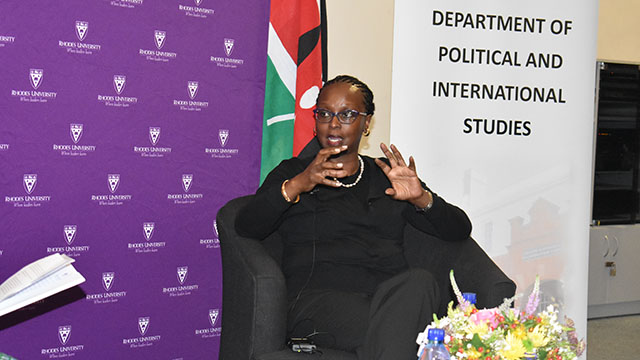
On 15 May, the Politics and International Studies department at Rhodes University, in association with the East African Society (EASoc), hosted a dialogue with the Kenyan Ambassador to South Africa, H E High Commissioner Jean Kamau.
Eden Grove Blue was beautifully decorated with the Kenyan and South African flags placed side-by-side, a symbol of African unity. Deputy Vice-Chancellor, Peter Clayton, said the dialogue was well timed, considering that it took place during Africa month and Rhodes University’s International Week.
Chaired by Politics lecturer, Shingi Mtero, the theme of the talk was Kenya’s democracy and its prominent role in the region. To start the conversation, Mtero probed on Kenya’s journey to becoming one of the most stable democracies in the region, to which Ambassador Kamau detailed the history of the country’s democracy. Kenya gained independence from Britain in 1964 and started as a multiparty democracy.
With time, those principles changed and the country moved to a single party democracy. Ambassador Kamau recalled the late 70s and 80s as a very dark period for the country, “The single party democracy was not responsive… it was far removed from the tenures of democracy. If you were not a member of the ruling party, you couldn’t access services and there was no space for civil society to organise.” The year 1992 marked a turning point as the Constitution reverted to multiparty elections. However, the dominant party was still able to manipulate and control state organs.
Kenya’s transition to a Constitutional democracy did not happen overnight as the country spent about eight years debating the form the Constitutional amendments would take.
Ambassador Kamau prides herself in the fact that the Constitution makes it very hard to tamper with Kenya’s electoral cycle that happens every five years.
Ambassador Kamau explained that Kenya’s democratisation has not been smooth sailing. For instance, the 2007 electoral process resulted in violence and a negotiated settlement. “In 2017 again, we had again a Supreme Court decision that determined that the elections were not free and fair and called for a repeat,” the ambassador expressed.
Presidential candidate, Raila Odinga withdrew from the re-elections then went on to call himself “the president of the people”. Mtero asked Ambassador Kamau what her views on this are, and she responded with the Barack Obama quote, “Africa doesn’t need strongmen, it needs strong institutions”.
Kenya has become an important force in the East African region, and Ambassador Kamau said her country would like to play a significant role in the area of peace and security in the region. Kenya has contributed to peacekeeping programs in neighboring states like Burundi and Somali and even going beyond the region into Liberia and Sierra Leonne.
“In terms of peace and security, this is one area we feel strongly about and we want to maintain that strong presence and contribution,” she said proudly. Ambassador Kamau went on to speak about the strong bilateral relationship between South Africa and Kenya, citing Jacob Zuma’s visit to Kenya in 2016 as a symbol of that.
The question and answer session sparked rigorous dialogue about topics ranging from the representation of women in parliament, Swahili as a continental language, tribalism, and Kenya’s information technology.
